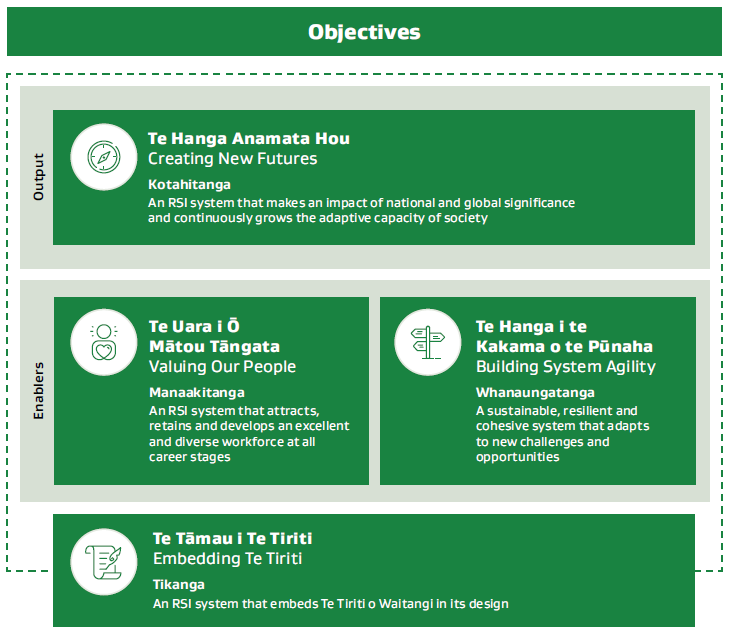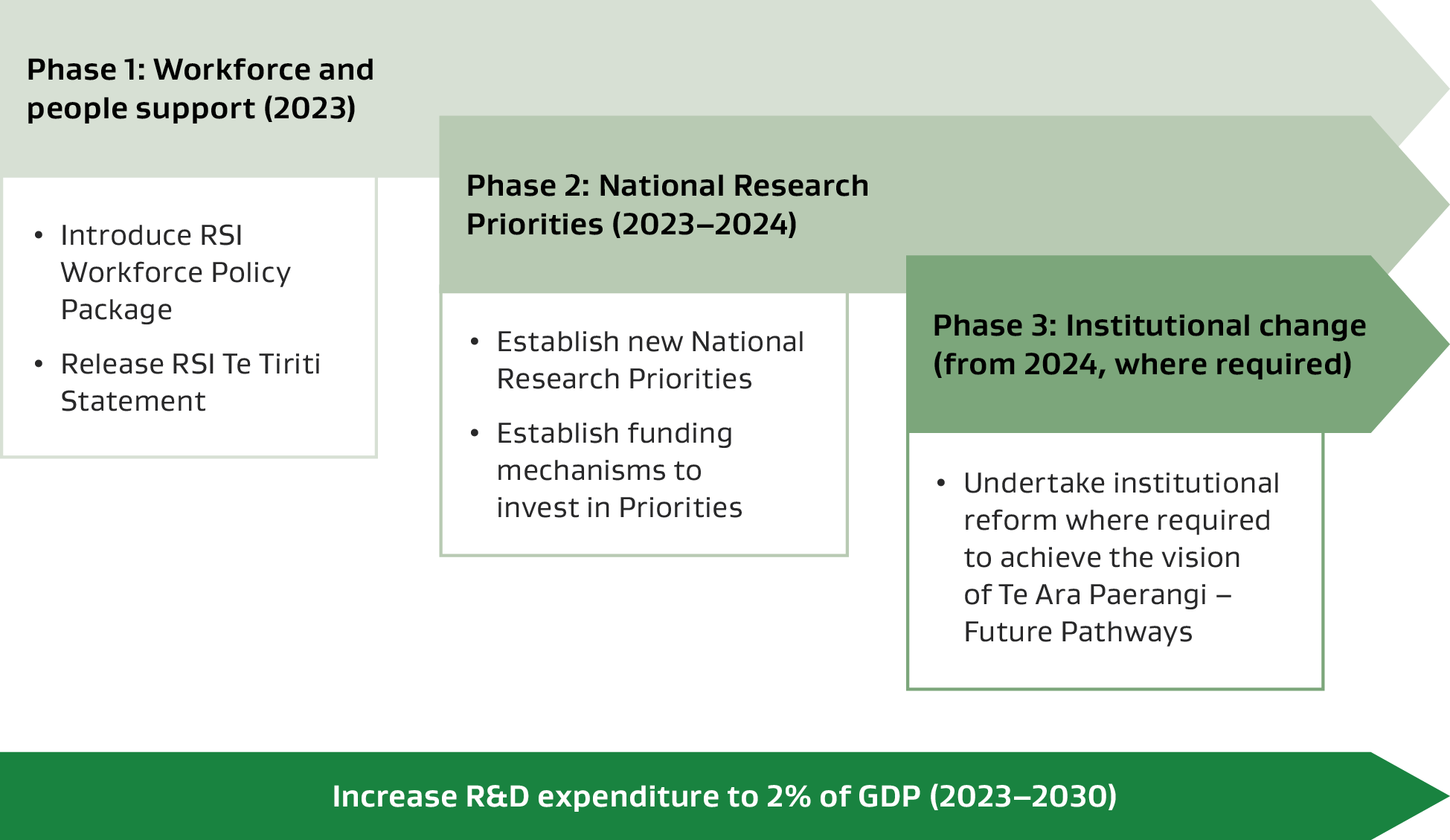Summary - Te Ara Paerangi Future Pathways White Paper 2022
On this page
This is the web version of the Summary Te Ara Paerangi Future Pathways White Paper.
Download the PDF version:
Te Ara Paerangi Future Pathways White Paper - Summary [PDF, 873 KB]
Te Matawhānui
Vision
An RSI system that supports wellbeing for all current and future New Zealanders, a high-wage low emissions economy, and a thriving, protected environment through excellent and impactful research, science and innovation.
Our researchers and innovators have served New Zealand well over the past 30 years. Crown Research Institutes (CRIs), universities and other TEOs, independent research organisations, and other parts of the RSI system have contributed to New Zealand on multiple fronts. Their contribution has spanned breakthrough research, supporting critical sectors of the economy and society, enhancing understanding of the natural world, solving environmental challenges, and responding to multiple emergencies, including underpinning our world-beating response to COVID-19. New Zealanders have all benefited environmentally, economically and socially from the work the research community has undertaken on their behalf.
But our system does not always set up our researchers and innovators for success. Too often their tremendous achievements occur despite the system in which they are operating, not because of it. In the face of tough economic conditions, social equity and inclusion challenges, and a climate emergency, it is essential that our RSI system is positioned to face the future and uplift the wellbeing of all New Zealanders.
Te Ara Paerangi – Future Pathways is a multi-year programme focused on the future of New Zealand’s RSI system. Through Te Ara Paerangi – Future Pathways, we are building a modern, future focused research system for New Zealand to meet the challenges and make the most of the opportunities ahead of us.
The purpose of this White Paper is to provide a single, enduring policy reference point for the Te Ara Paerangi reform programme. This White Paper presents a high-level design and vision for New Zealand’s ‘public’ RSI system, including key policy directions and actions, and provides a roadmap to implement the reform programme.
The substantial reforms signalled in Te Ara Paerangi will create the uplifts required to grow both individual and collective wellbeing, environmental sustainability, and economic productivity. This means building a future RSI system that gives effect to Te Tiriti o Waitangi, is adaptable by design and connected for impact, and reflects Aotearoa New Zealand’s unique context and diverse population.
The RSI system of the future needs to:
- create the knowledge and innovation that will drive improvements in individual and collective health and wellbeing, environmental sustainability and economic productivity
- Affirm and embed Te Tiriti o Waitangi and provide appropriate opportunities for mātauranga Māori, Māori researchers and Māori-led research
- capture and enhance the full value of investment, nationally and internationally, from research and science
- improve system efficiency and effectiveness.
Te Hanga Anamata Hou Creating New Futures
1.1 Establish National Research Priorities
- Develop a system of National Research Priorities.
- Honour Te Tiriti o Waitangi and support Māori aspirations through the inclusion of Māori-focused and Māori-led Priorities.
- Enable government to direct a critical mass of RSI resources towards the most important challenges and opportunities.
- Create impact through mission focus and strengthened connection and engagement between government, researchers, industry, iwi and Māori leaders, end users and communities.
- Establish a funding mechanism to proactively invest in the determined priority research areas.
1.2 Accelerate innovation, diversify and scale up impact
- Promote knowledge mobilisation to accelerate innovation, by incentivising transdisciplinary research teams (drawing expertise from CRIs, Universities and research partners, like the health and environmental sectors, and leveraging new digital and data tools)
- Grow existing connections between research, industry and other end-users.
- Increase the mobility of the RSI workforce.
- Establish new ways to develop and deliberately invest in focused innovation systems.
- Better utilise our knowledge.
- Increase public expenditure on R&D beyond historic rates.
1.3 Grow global connectivity
- Better facilitate global cooperation and collaboration through more favourable funding settings.
- Complete Association with Horizon Europe.
- Provide more proactive government leadership through National Research Priorities in creating opportunities for global cooperation, accessing multi-national/global research infrastructures and participating in global research communities at more optimal scale.
Te Tāmau i Te Tiriti Embedding Te Tiriti
2.1 Advancing Māori aspirations in the RSI system
- Increase the proportion of research funding directly supporting Māori aspirations by creating new funds or ring-fencing portions of existing funding.
- Ensure appropriate Māori representation at all levels so that the RSI system better reflects Māori values and tikanga.
- Include Māori-led Priorities in National Research Priorities to grow Māori-led RSI (see policy direction 1.2).
2.2 Investing in mātauranga Māori, Māori knowledge
- Partner with Māori to explore development of a dedicated platform for mātauranga Māori expertise in RSI.
- Support the stronger deployment of RSI system resources to the regions.
- Encourage and support RSI institutions to develop standards and guidelines to ensure researchers have the competency to engage with Māori and te ao Māori, and vice versa.
2.3 Crown to lead by example
- Publish a Tiriti Statement that outlines how MBIE will honour Tiriti obligations and give life to Tiriti opportunities.
- Lift the capability of Crown employees to engage with and partner with Māori.
Te Uara i Ō Mātou Tāngata Valuing Our People
3.1 Attract, develop, and retain talented people
- Expand fellowship schemes.
- Address settings in the funding system that disincentivise permanent or longer-term employment contracts.
- Establish clear capability development expectations within the design of the upcoming National Research Priorities.
- Expand support for training our people and access to development opportunities for a broader range of research careers.
- Co-ordinate international talent attraction schemes.
3.2 Supporting diversity at all levels
- Grow representation of women, Māori and Pacific Peoples, particularly for senior staff and management roles in public research organisations and tertiary education organisations.
- Introduce dedicated fellowships for Māori and Pacific Peoples to reduce underrepresentation in the RSI system.
- Review funding assessment processes to better recognise the diversity of skills needed for research success.
3.3 Empowering Pacific Peoples
- Work across government and with Pacific researchers to design a definition and framework for ‘Pacific research’ and ‘Pacific research excellence’.
- Grow sustainable pathways for Pacific People across the RSI workforce through funding of Pacific Research fellowships and supporting access to workforce development opportunities.
- Lift the capability to Crown employees to engage with Pacific Peoples and apply a Pacific lens to policy development.
Te Hanga i te Kakama o te Pūnaha Building System Agility
4.1 Clarify roles and responsibilities
- Clarify the roles of government agencies in owning and funding some public good RSI functions and applied research.
- Locate functions that currently sit in government entities where they will be most effective and most efficiently managed.
4.2 Co-ordinating investment in future-oriented infrastructure
- Develop a system-wide infrastructure roadmap.
- Consider opportunities for consolidation of building investments.
- Shift the mix and scale of funding mechanisms towards more long-term funding approaches aimed at growing capability and addressing long-term challenges.
- Establish long-term funding envelopes for public good science services.
4.3 Designing resilient and adaptable public research organisations
- Consider institutional reforms to ensure that our public research organisations have the scope and scale to adapt to emerging priorities.
- Grow the capacity of our public research organisations through increased funding aligned closely to National Research Priorities and the delivery of public good science services.
- Strengthen the requirements on our institutions to support good workforce outcomes and affirm and embed Te Tiriti into institutional practice.
- Ensure that our public research organisations are resourced to deliver the public good services that we require from them.
- work closely with the sector through any changes to ensure our workforce are supported.
4.4 Funding mechanisms that support system goals
- Enhance the operation of funding contests.
- Consider options to fund participation in international funding competitions.
- Continue to support excellent research, ensuring that the settings provide opportunities for new and mid-career researchers to successfully compete for funding.
- Encourage investment in workforce development and reduce career precarity.
- Introduce, where appropriate, new funding approaches to support the wider goals of the reform.
- Improve transparency of overhead funding and expenses.
- Consider modes of assessment and funding.
- Consider the implications of Te Ara Paerangi for the Performance Based Research Fund (PBRF).
Ngā Mātāpono me ngā Whāinga Whakahou
Reform Principles and Objectives
The reform objectives provide a framework for how we will achieve our vision for the RSI system and respond to the case for change. Each objective is supported by key policy directions that set the course for the reform programme. The objectives of Te Ara Paerangi – Future Pathways emphasise a wellbeing approach to reform.
As such, they reflect the four wellbeing principles of He Ara Waiora, a framework to understand a Māori perspective of wellbeing: Kotahitanga, Tikanga, Manaakitanga and Whanaungatanga.

Text of image
Te Whakatinana
Implementation
The White Paper marks the beginning of the change programme of Te Ara Paerangi – Future Pathways. We are committed to working with the sector, and in partnership with Māori and with Pacific Peoples, as we implement changes.
Phase 1 of the reform will begin to make significant changes for the workforce and start embedding Te Tiriti o Waitangi in the RSI system in 2023.
Phase 2 of the reform will focus on establishing National Research Priorities. Work is planned to begin on this in 2023, with high-level National Research Priorities agreed in 2024.
Phase 3 of the reform will implement any changes required to our public research organisations, governance arrangements and funding mechanisms to achieve the vision of Te Ara Paerangi.
The phases of reform indicate periods where the main focus of our efforts will be. At any given time we may expect to be consulting, conducting analysis, releasing design documents, implementing changes, or evaluating results on all items in the programme.

Text of image

